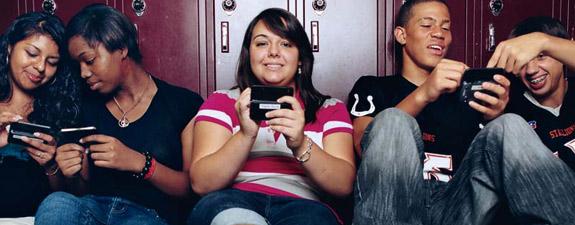
Cell phones are quickly becoming a staple in the daily life and functions of people around the world. From providing you with endless hours of entertainment to keeping in touch with family, friends and even helping you find that special someone through an Internet dating app, there's no question why smartphones have become so popular. But it doesn't stop there. More than anything else – yes, even gaming – smartphones are tools. They help run businesses and allow you to keep a world of knowledge and information in your pocket.
It's these very capabilities that make cell phones (and tablets, too) particularly advantageous in some of the last places you would ever think. First and foremost, some schools have started dabbling on the idea of allowing mobile phone and tablet use in the classroom. The Guardian reports that a secondary school in Kent became the first in the UK to equip each of the 1,400 students in attendance with iPads. Some grade schools and universities across the United States have also done this, while others give their students a choice between a computer or a tablet.
Recent studies reveal that 88 percent of students have used their cell phone for texting in class, and 30 percent use it more than once per class. Cell phones being allowed in class would be a dream come true ... for students. Gone would be the days of straining your neck and eyes to text under the cover of a table or desk, and Facebooking during those dreadfully boring lectures would be so much easier.
It is this very reason that teachers oppose technology use in the classroom, despite all the advantages it could actually bring to the students. Research and reference look-up could be done from the student's desk – no more trips to the computer lab. Specialized applications and educational software could be loaded onto students' devices to better cater to the individual needs or shortcomings of each student. Homework assignments could be synchronized automatically. The possibilities are quite literally endless.
Teachers and administrators worry that cell phones will cause distractions and might potentially make them lose control of their class. Without the right approach, I have no doubt in my mind that it would. Students would be playing Angry Brids and tweeting before the teacher could say, "Good morning, class."
So how could they actually make classroom cell phone use helpful instead of distracting?
They could always take the time to patrol the room and keep everyone on task, like they always did when I was in high school of course. Sure, some students would inevitably slip through the cracks. But there are no stopping some people; they will do anything and everything they can, stopping at nothing, to defy the teacher and stay off task. And students at desks using the tiny screens of a smartphone is much harder to monitor than an 18-inch computer monitor.
Any applications that require a data connection actually wouldn't be too hard to block out. Issuing cell phone jammers – which many schools already do anyway – would keep them from getting on the Internet via data connection. They could then have the students join a provided Wi-Fi network that blocks out any sites they see fit (adult sites, social media, etc.). It's keeping them off of those ridiculously addicting games that would be the hard part.
Another problem is equal opportunity. Not every family can afford to provide their child with a smartphone. This is where the school would have to step in and provide them with one (not for keeps), and something like the Kindle Fire would be the perfect solution. It's cheap, sufficient and with a little work, could be locked down to the school's specifications. In turn, this could keep students from installing and running other software and games and help keep them on task.
Personally, I used a BlackBerry my last two years of high school to take notes, schedule my homework assignments and projects, and even to write some of my papers. Most teachers were skeptical, but I'm sure they were looking for anything that might pacify me and keep my mouth shut for a few minutes. I will admit, it was easy to get distracted and Facebook, texting and Brick Breaker often stole me from a lesson. Fact is, however, I could tap out notes faster than I could ever write them down and I would never lose them, thanks to things like Evernote.
Although it never affected my grades at all, it could definitely be a problem on a much larger scale. I was the only person using a phone in class, so they probably didn't notice all that much. But with 20 to 30 students with their heads buried and fingers pecking away at a phone or tablet during a lecture might have the teacher wondering what they're really doing.
Sure, it might take a little work. Not every school can afford to equip a few thousand students with $200 (or more) tablets and it brings some serious potential behavior concerns into question. But with the right amount of elbow grease, it could give students of today a huge leg-up on previous generations. Then again, it could cause severe dependencies on technology. But that's another story for another time.
What say you? Should tablets and smartphones be allowed in the classroom? Or are they more trouble than they are worth? If you are a student who has successfully used a tablet or phone in class, tell us how it has helped you.
Image via Fast Company